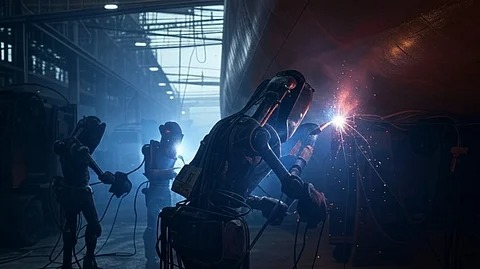In a move signaling heavy industry’s accelerating automation race, HD Hyundai Robotics and HD Hyundai Samho have launched real-world trials of advanced humanoid robots at Korean shipyards. The partnership leverages Germany’s Neura Robotics rather than Hyundai’s own Boston Dynamics assets, highlighting a strategic bet on external innovation to tackle one of manufacturing’s most complex environments.

The collaboration centers on Neura’s 4NE-1 cognitive robots’ AI-driven systems capable of adaptive learning and handling payloads up to 220 pounds. These humanoids will perform welding and assembly tasks traditionally requiring skilled tradespeople, a workforce segment facing critical shortages. According to project engineers, the robots’ “cognitive” capabilities allow them to navigate unpredictable shipyard conditions, interpret sensory data, and make operational decisions without constant human oversight.
The Labor Crisis Fueling Automation
South Korea’s shipbuilding resurgence has collided with a demographic reckoning. As veteran workers retire, younger generations avoid industrial trades, forcing yards to recruit over 16% of their workforce from Southeast Asia, primarily Thailand, on temporary visas. In 2023, foreign laborers comprised nearly all new hires at major Korean shipbuilders. HD Hyundai’s robotics push directly addresses this unsustainable dependency.
“Welding humanoids will not only boost productivity but significantly reduce worker burden and enhance safety,” said HD KSOE Senior Vice President Dong-ju Lee in a related project announcement. The urgency extends beyond efficiency: shipyard welding involves hazardous fumes, extreme temperatures, and injury risks that automation could mitigate.
Why Humanoids? The 4NE-1 Advantage
Unlike stationary robotic arms, Neura’s bipedal 4NE-1 platform mimics human mobility, crucial for navigating confined compartments and multilevel decks in vessel construction. Its cognitive architecture processes real-time environmental data, enabling adjustments during tasks like overhead welding or navigating obstructed pathways. HD Hyundai Robotics will train the systems using proprietary path-learning data from decades of welding automation, while Neura refines physical intelligence algorithms.
David Reger, CEO of Neura Robotics, emphasized the shipyard’s extreme demands: “Together with Hyundai, we’re laying groundwork for entirely new paths in intelligent automation”. Initial tests at HD Hyundai Samho facilities will validate durability in corrosive, high-vibration settings where off-the-shelf robots fail.
Dual Paths to Automation
The Neura trials reveal Hyundai’s parallel automation strategy: while leveraging external expertise for immediate solutions, it’s developing proprietary alternatives. In May 2025, HD Hyundai Robotics signed a separate agreement with Houston-based Persona AI and Korean firm Vazil to create custom humanoid welders. That project targets 2026 prototypes and 2027 deployment, suggesting Hyundai views robotics as a mid-term necessity, not a distant experiment.
Sanghun Ryu, Executive Director of HD Hyundai Samho’s Automation Innovation Center, stressed specialization: “We’ll apply robots meeting diverse quality requirements of shipbuilding”. This includes tailoring systems to handle thick, curved hull plates and uneven seams tasks requiring precision beyond most factory applications.
The Global Smart Shipyard Race
Hyundai’s investment reflects a broader industry pivot. With Chinese and European rivals accelerating automation, productivity becomes a competitive multiplier. Korean yards currently dominate Greek newbuilding orders (62% in early 2025), but labor instability threatens this lead. Cognitive robotics could sustain an advantage where human labor cannot scale.
As Neura’s Reger noted, the partnership marks “a milestone in global advancement of intelligent, collaborative robotics”. Success may redefine not just shipbuilding, but how heavy industry everywhere balances human workers and intelligent machines. The 4NE-1 trials represent more than technical testing; they’re a blueprint for survival in 21st-century manufacturing.
Subscribe to my whatsapp channel


Comments are closed.